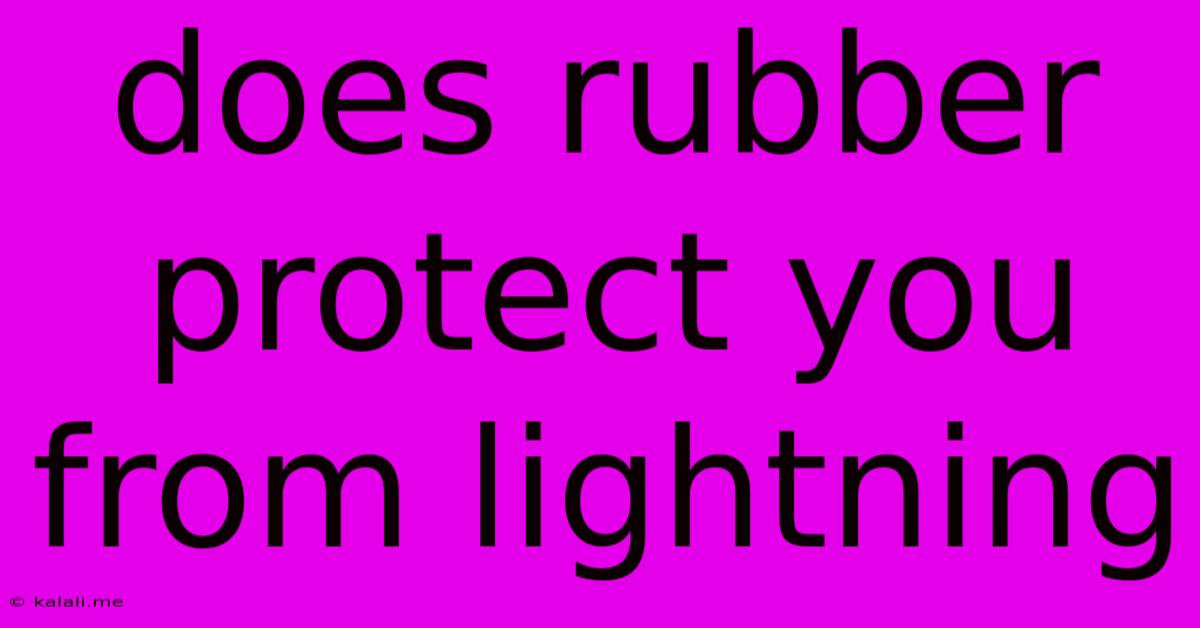Does Rubber Protect You From Lightning
Kalali
Jun 10, 2025 · 3 min read

Table of Contents
Does Rubber Protect You From Lightning? Separating Fact From Fiction
Meta Description: Many believe rubber protects against lightning strikes, but is this true? This article explores the science behind lightning protection, debunking common myths and explaining how to stay safe during a thunderstorm.
Lightning strikes are a terrifying and potentially deadly natural phenomenon. The raw power of a lightning bolt is enough to cause widespread damage and serious injury, or even death. So, it's understandable that people seek ways to protect themselves. One common belief is that rubber, such as that found in tires or rain boots, offers protection. But does rubber actually protect you from lightning? The short answer is: no, not reliably.
While rubber is an insulator, meaning it resists the flow of electricity, it's not a foolproof shield against the immense power of a lightning strike. Let's delve deeper into why.
Understanding Lightning Strikes
Lightning strikes occur when a powerful electrical discharge occurs between a cloud and the ground (or between clouds). This discharge seeks the path of least resistance, often targeting tall, pointed objects like trees or buildings. The voltage involved is incredibly high, far exceeding the insulating capacity of even thick layers of rubber.
Why Rubber Isn't Sufficient Protection
- Insulation is relative: Rubber's insulating properties are effective against relatively low voltages. A lightning bolt, however, generates billions of volts. This immense voltage can easily overcome the insulating properties of rubber.
- Path of least resistance: Lightning will find the easiest path to ground, regardless of the presence of rubber. If you're the closest path of least resistance, the lightning will strike you, even if you're wearing rubber boots.
- Grounding effects: The ground itself can conduct electricity, and even if the rubber prevents a direct strike to your body, the current could still flow through the ground and up your legs.
Effective Lightning Safety Measures
Instead of relying on rubber, focus on these proven safety measures during a thunderstorm:
- Seek shelter indoors: The safest place during a thunderstorm is a sturdy building with proper electrical grounding.
- Avoid water: Water is an excellent conductor of electricity. Stay away from pools, lakes, and other bodies of water.
- Stay away from tall objects: Trees, flagpoles, and other tall objects are more likely to be struck by lightning.
- Unplug electronic devices: Lightning can travel through electrical systems, damaging appliances and posing a shock hazard.
- Wait 30 minutes after the last thunder: Lightning can still strike even after the storm appears to have passed.
Debunking the Rubber Myth
The misconception that rubber protects against lightning likely stems from a misunderstanding of electrical insulation. While rubber can provide protection from minor electrical shocks, it's utterly inadequate against the sheer power of a lightning strike. Don't rely on rubber boots or a rubber-tired car as protection during a thunderstorm.
Conclusion
While rubber is an insulator, it offers negligible protection against a lightning strike. The immense voltage of lightning easily surpasses the insulating capabilities of rubber. Prioritize proven safety measures to protect yourself during a thunderstorm, focusing on seeking sturdy shelter and staying away from potential strike points. Remember, safety during a lightning storm is paramount – don't gamble with your life.
Latest Posts
Latest Posts
-
How Long Does A Humidifier Take To Work
Jun 10, 2025
-
Are There Liches In Harry Potter
Jun 10, 2025
-
How To Ground A Ceiling Fan
Jun 10, 2025
-
What Does Low Oil Life Mean
Jun 10, 2025
-
Did All Of Odysseus Crew Die
Jun 10, 2025
Related Post
Thank you for visiting our website which covers about Does Rubber Protect You From Lightning . We hope the information provided has been useful to you. Feel free to contact us if you have any questions or need further assistance. See you next time and don't miss to bookmark.